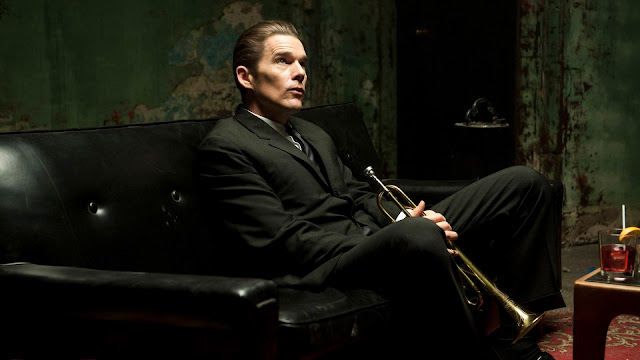Born To Be Blue
The jazzman loves the girl, perhaps more than all the previous; he has ex-wives. She's resistant at first, but he's awfully seductive. His heart aches when she tells him she can't be there to see him play at Birdland, perhaps the most important performance of his career. But there's a greater love/ball-and-chain, one that allows no disloyalty, no divided attention. Jazz? Yes, certainly a consuming passion. The reason for his very existence, the only thing he knows how to do. But at this point in life, jazz, legacy building jazz, is made possible by something else that consumes. Heroin. That substance that "opens up the notes..." His mentor, Charlie Parker, suffered such affliction.
There is a moment late in 2015's BORN TO BE BLUE when trumpeter Chet Baker is sitting in a dressing room, about to blow those notes in front of the likes of Dizzy Gillespie and Miles Davis, the latter who thinks this white cat from the west coast isn't worthy to mop the floor at Birdland. Baker has been clean, taking Methadone, accountable to a parole officer, refusing "gifts" from would-be groupies. But he ran out of Methadone two days ago. His manager says he can find some. There is also a needle and a cord on the table......
Ethan Hawke, looking much older than his forty-five years, embodies Baker in ways that are positively eerie. The gaunt, sunken cheeks are what you notice first. The sickly pallor of skin tone. What appears to be a processing delay when someone speaks to him. The actor does his own singing, including a none too shabby rendition of "My Funny Valentine". I believed his performance most of the time, and that's critical for any biopic. But with BORN TO BE BLUE, a film that is more the essence of Chet Baker than an accurate recount, that Hawke in all his wraith-like presence is believable as a mid-twentieth century jazzer legend junkie is what matters. The fact the film calls him Chet Baker is almost an afterthought.
Writer/director Robert Budreau uses an effective conceit - monochromatic footage of a film Baker shot about his life that was never released. Not real footage, but Hawke as Baker playing himself. Budreau employs these scenes to show key moments in the trumpter's life: his first taste of the H, the night his wife caught him doing it, among others. This idea is continued through much of BORN TO BE BLUE, sometimes used to convey Baker's memories, usually when he's suffering misfortune. Baker is attacked by drug dealers and loses all his front teeth. The road to re-learning to play the trumpet is arduous. He has to keep re-gluing his dentures.
But by his side is his former co-star in the movie within a movie: Jane (Carmen Ejogo, quite good), who played his ex-wife Elaine. The surreality of her resemblance to Elaine is played for some interesting moments through BORN TO BE BLUE. Budreau's film also takes standard issue backstage drama and makes it feel more honest than what is usually seen in a movie such as this. Chet and Jane share a sex scene that is tender and awkward. She is unusually supportive, even when she finds him on the floor bloodied, needle by his side. She's with him when he returns home to see his folks in Oklahoma, and reduced to pumping gas for money. They live in her VW bus. She loves him, but will perhaps realize this his first love are those wide notes, and what makes them happen, when she reads his face one last time while he plays. Such a moment is all in the acting, and both play it perfectly. It's heartbreaking.
Does this film argue that drugs bring out one's best, most creative work? Maybe, certainly at a considerable cost. The epilogue states that Baker would spend much of his later days in Europe, addicted to heroin for the rest of his life, and quite prolific. Music that was deemed to be some of his finest. Another genius who was born to be blue.



Comments